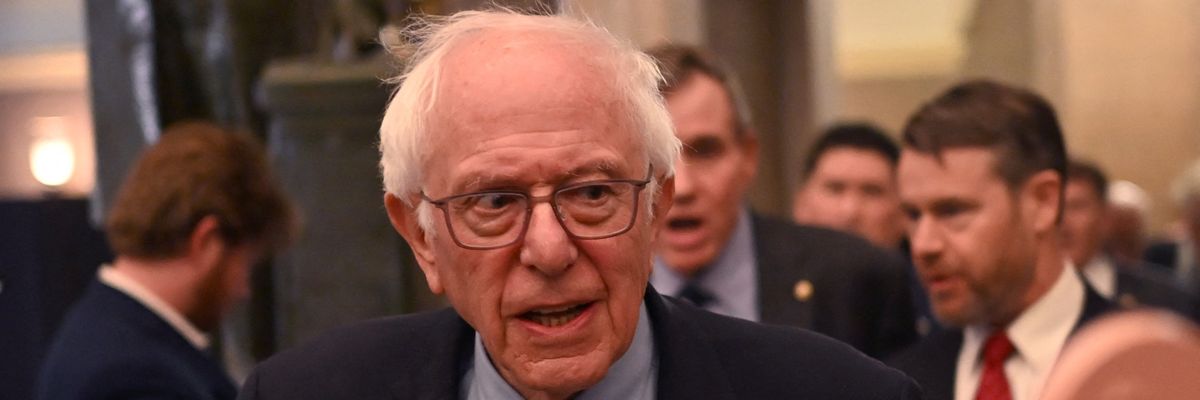If working-class people in the United States were wondering why President Donald Trump had "very little to say about the REAL crises facing the working class of this country" in his State of the Union address, said U.S. Sen. Bernie Sanders Tuesday night, they need look no further than the people Trump surrounded himself with at his inauguration in January.
"Standing right behind him were the three wealthiest men in the country," said the Vermont Independent senator, naming billionaire mogul and "special government employee" Elon Musk, Amazon founder Jeff Bezos, and Meta CEO Mark Zuckerberg. "And standing behind THEM were 13 other billionaires who Trump had nominated to head major government agencies. Many of these same billionaires—including Musk—were there tonight."
Despite Trump's repeated campaign promises to address the rising cost of living for working people, said Sanders, the State of the Union address offered the latest proof that "the Trump administration IS a government of the billionaire class, by the billionaire class, and for the billionaire class."
Watch Sanders' address in full:
Sanders amplified the message he has sent on his National Tour to Fight Oligarchy—which he is scheduled to continue this week with stops in Warren, Michigan on Saturday and Kenosha, Wisconsin on Friday.
The senator called on working people of all racial identities, religions, and sexual orientations to join together to fight Trump's agenda and the billionaires who would benefit from his tax cuts, slashes to essential public services like Medicaid and food assistance, and efforts to divide people by demonizing immigrants, transgender people, and people of color.
"Yes, the oligarchs ARE enormously powerful. They have endless amounts of money. They control our economy. They own much of the media. They have enormous influence over our political system," said Sanders. "But, from the bottom of my heart, I am convinced that they can be beaten."
"If we stand together and not let them divide us up by the color of our skin or where we were born or our religion or sexual orientation; if we bring our people together around an agenda that works for the many and not the few—there is nothing in the world that can stop us," he said.
In his address, Sanders remained laser-focused on issues that impact working people—raising the federal minimum wage of just $7.25 per hour to a living wage of $17 per hour, repealing the Citizens United Supreme Court ruling to end corporate influence over elections, and Trump's desire to pass a "big, beautiful" budget that would cut Medicaid by $880 billion, leaving up to 36 million Americans, including millions of children, without health insurance.
His response to the State of the Union address contrasted sharply with parts of the Democratic Party's official response given by Sen. Elissa Slotkin (D-Mich.), who spoke out against the "unprecedented giveaway" Trump wants to give "to his billionaire friends" but also signaled the party leadership's disinterest in focusing primarily on issues that impact working people when she spoke positively about former Republican President Ronald Reagan.
"After the spectacle that just took place in the Oval Office last week, Reagan must be rolling over in his grave," Slotkin said, referring to Trump and Vice President JD Vance's attacks on Ukrainian President Volodymyr Zelenskyy. "As a Cold War kid, I'm thankful it was Reagan and not Trump in office in the 1980s."
Historian Moshik Temkin wondered why the Democratic Party chose to hold up Reagan as a positive example of a president—considering his deregulatory, anti-taxation policies and promotion of so-called "trickle-down economics" that helped pave the way for rising economic inequality and the decimation of the middle class—instead of former President Franklin D. Roosevelt, who introduced Social Security, reformed the financial system, and provided relief to people who were suffering due to the 1929 stock market crash and the Great Depression.
"Who was this for?" asked historian Michael Brenes of Slotkin's address. "You don't rebuild the New Deal coalition with Cold War nostalgia and deference to Ronald Reagan. A better message: national security begins with economic security."
In contrast, Sanders' response, said former journalist and author Paul Handley, "is how you respond to Trump and define him for the American people."
Sanders ended his address by acknowledging the challenge of fighting against a political system increasingly controlled by billionaires, but warned, "despair is not an option."
"Giving up is not acceptable," said Sanders. "And none of us have the privilege of hiding under the covers. The stakes are just too high. Let us never forget. Real change only occurs when ordinary people stand up against oppression and injustice—and fight back."
"We can win. We will win," he concluded. "Let's go forward together."




